
11 Jul, 2017
Thai hotels show that it pays to be Muslim-friendly
Bangkok – July 8 marked the start of Buddhist Lent, a three-month period of abstinence from alcohol and other forms of self-restraint. As Buddhists still have to travel for both business and leisure, those keen to abide by the Lord Buddha’s precepts may find it easier to avoid alcohol by staying in a Thai Muslim-friendly hotel. As per the common guidance of both Islam and Buddhism, Muslim-friendly hotels are permanently alcohol- and nightlife-free.
Annually, alcohol kills scores more people than U.S. gun violence and destroys families and communities. Today, following in the footsteps of tobacco-free public places, alcohol-free hotels are proudly emerging all over the ASEAN region, forging a unique cultural bond between the two ways of life whose adherents comprise the majority of peoples in one of the world’s most dynamic regions. Equally important, Muslim-friendly hotels are finding that the positioning statement delivers business results too.
At a resinar (newly-coined shorthand for ‘research’ and ‘seminar’) organised by this editor in Bangkok on 04 July 2017, two Thai executives of Muslim-friendly hotels discussed their role in promoting Thailand to what will be one of the most promising source-markets: the Islamic world. Mr. Sanya Saengboon, MD and General Manager of the newly-opened Al Meroz Hotel, and Mr. Adam Phadungsilp, Resident Manager, Nouvo City Hotel, stated they are projecting occupancies respectively of 92% and 80% this year, thanks to robust support from both Muslim and non-Muslim guests, strong F&B sales and MICE business.
Both said that being alcohol-free makes no difference to the non-Muslim guests. On the contrary, they said, being ‘dry’ is actually an advantage for attracting the family market, especially those travelling with young children.
Although the business benefits of Muslim-friendliness are a major plus-point, the resinar had far higher objectives to achieve. It was intended to honour the policies of Thailand’s late monarch, His Majesty King Bhumibhol Adulyadej who, in line with his proclamation to reign justly for the benefit of all Thais and build an inclusive society, maintained close contact with the country’s six million Thai-Muslim population through regular visits and presence at Islamic events. It was also intended to promote ASEAN integration in line with the principles espoused in the ASEAN Socio-Cultural Community (ASCC) blueprint, and strengthen relations between Muslim-Buddhist communities.
In my opening presentation, I stressed that jobs, tourism and investment would come automatically if the above-mentioned fundamentals remained strong. In strengthening those fundamentals, I said the Thai-Muslim community could take the lead in taking Thailand towards an era of 5.0, beyond the current Thailand 4.0 development agenda of the military-led government.
The resinar was opened by PATA CEO Mr Mario Hardy who noted the Association’s growing involvement with the Islamic world, including a range of PATA events in Malaysia, Indonesia, Bangladesh and the Maldives, and rising membership from the Gulf countries. It attracted a small but quality group of participants including representatives from the Dusit and Anantara groups, the Landmark Bangkok, Asia Hotel, Baiyoke Sky Suites, and three PATA interns. Also present was Prof Dr Adarsh Batra, Program Director, MBA-Tourism at the Graduate School of Business, Assumption University.
For the last two decades, Thailand has been at the forefront of attracting Muslim visitors. There is universal recognition of the market opportunities presented by a global Muslim population of 1.6 billion, mainly young people, scattered across 57 member countries of the Organisation of Islamic Cooperation, as well as the massive Islamic diaspora in other countries such as India, Russia, China and South Africa.
The speakers pointed out that in terms of popularity as a destination for Muslim visitors, Thailand is ranked just under Singapore amongst the non-member countries of the Organisation of Islamic Cooperation but has enormous potential to overtake its ASEAN neighbour if proper marketing strategies and training programmes are undertaken. Indeed, Thailand’s Muslim citizens are well placed to help the kingdom advance the ASEAN integration process and bolster its status as a hub for Halal food and cuisine.
As of the April 2017 flight schedule, Thailand had 741 weekly flights from cities in 18 Muslim-majority countries, more than any other country in Asia. It also gives visa-free and/or visa-on-arrival facilities to citizens of 12 Muslim-majority countries. Visitors from the UAE, Saudi Arabia and Kuwait are the top average daily spenders, according to 2015 statistics published by the Tourism Authority of Thailand.
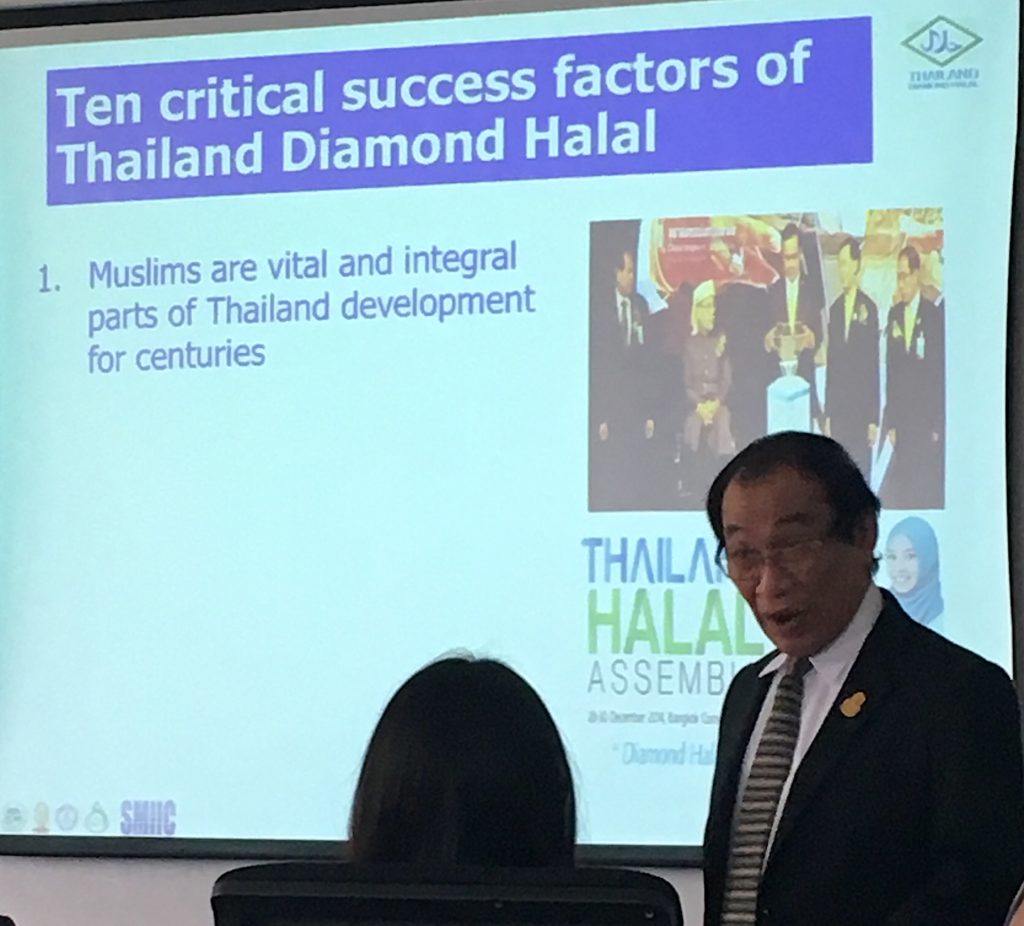
Dr Pakorn Piyakorn
Another prominent speaker at the resinar was Dr Pakorn Piyakorn, Director, Halal Standards Institute of Thailand (HSIT). He said that Halal certification in Thailand was initiated in 1969. The Single Halal Logo country authorized by Central Islamic Council of Thailand began with the agricultural sector and then expanded to cover industrial products. Up to 2014, halal certification had been given to 4,000 factories covering 120,000 products (10% for export). The next step, he said, is to expand into services. The Central Islamic Council of Thailand, HSIT and the Halal Science Centre, Chulalongkorn University, have launched a unified “Thailand Diamond Halal” brand to help Muslim-friendly products and service providers better market themselves.
A process is under way to set up a Thailand Muslim Friendly Hospitality Services Standard (TMFHS) covering accommodation, tour packages and tourist guides. He described this as “a Shariah-guided requirement for tourism industry players in setting up an assurance to preserve the integrity of products and services catering to Muslim travelers.” It will not apply to health and beauty facilities such as spa and massage or any type of body therapy facilities, products and services. Public hearings are to be held in September in anticipation of launch in October.
Dr Pakorn noted that the behavior and profile of Muslim travellers are changing. In addition to seeking destinations that offer Muslim-friendly facilities, they are seeking places which are safe. He cited the growing trend towards Islamophobia in the West and recent attacks on Muslims by white supremacists and extremists in the United States and Europe as examples of events that influence choice of destinations by Muslim travellers.
The two hoteliers, Mr Sanya and Mr Adam, provided some interesting personal and professional experiences on managing and delivering the customer experience. Both said that positioning their respective properties as being Muslim-friendly was proving a success, contrary to conventional wisdoms. Guests are impressed with the high level of service, cleanliness, attention to detail and the congenial, multi-cultural atmosphere.
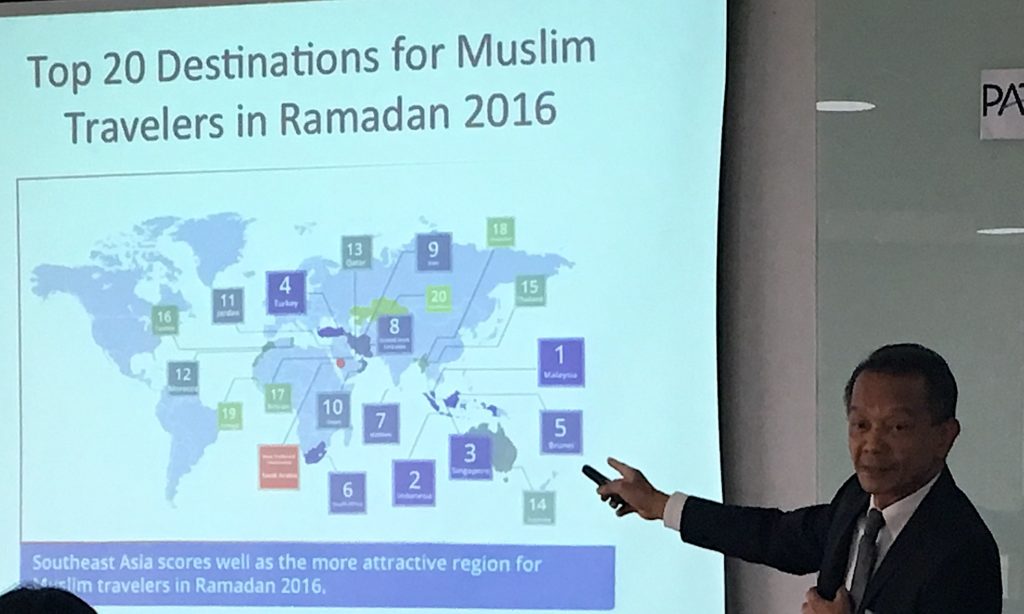
Mr Sanya Saengboon
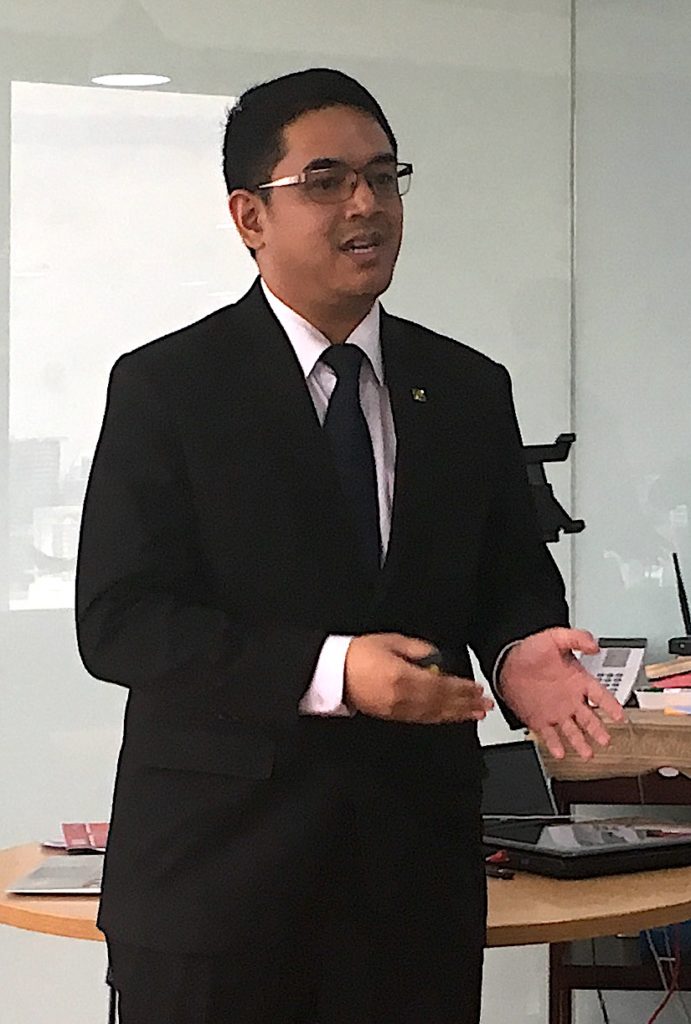
Mr Adam Padungsilp
Both hotels have a location advantage. The Al Meroz (which means ‘Heritage’ in Arabic) is located in the Bangkok suburb of Ramkhamhaeng, close to a major sports stadium and right opposite the Islamic Centre of Thailand. Mr Sanya said sports teams from Islamic countries participating in international tournaments are always accommodated at there. It is also the first choice for functions organised by the Islamic Centre, MICE events by Muslim-owned businesses, private parties and weddings by Thai-Muslim families, and events hosted by the Islamic diplomatic missions and airlines in Thailand.
In turn, the Nouvo City is near the key tourists spots of the Grand Palace, the offices of the United Nations agencies and many Thai government ministries. As an accredited UN hotel, it accommodates delegations from Islamic countries attending UN meetings as well as the many non-government organisations holding UN-associated events. Many tour guides, especially Thai-Muslims, take groups to the Nouvo City for the daily buffet lunch, generating about 200-300 covers a day. The Thai Government holds many events, especially if they include representatives from Muslim-majority provinces of South Thailand. Backpackers from all around the world find it most convenient to be so close to the central Bangkok tourist spots and the Khao Sarn area.
Mr. Adam said that the non-Muslim visitors walk away with a pleasantly different impression from the distorted stereotyped images (aka ‘fake news’) of Muslims as being violent people. “They realise that Muslims are normal people, just like anyone else.” He also showed how the hotel deals with the stereotype questions that usually come up. (Editor’s note: Readers are requested to credit the Nuovo City hotel, Bangkok as the source if reproducing any of the following slides)
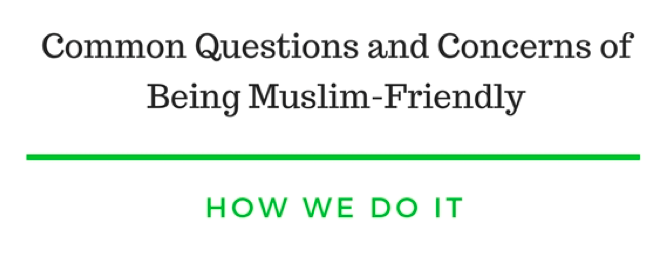
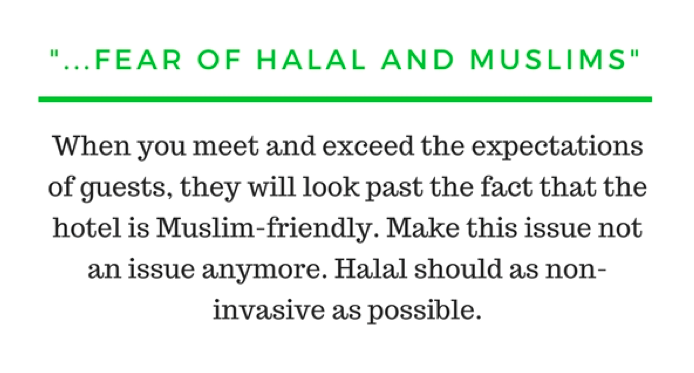
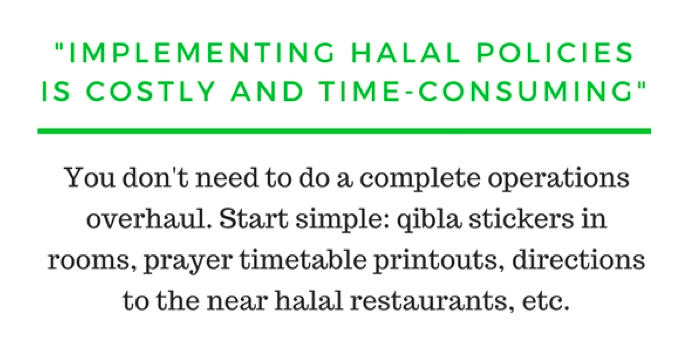
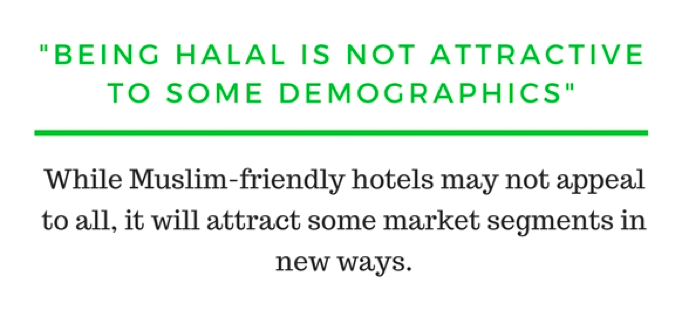
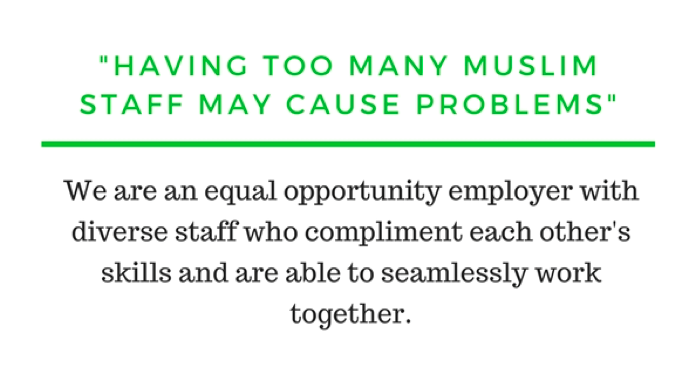 There is a clear business dividend. The Nuovo City, which originally started in the mid-1980s as rooms for rent for local market vendors, has now graduated into a four-star, boutique style accommodation with 270 rooms, two restaurants, two swimming pools, a choice of function rooms and jobs for 200 people. In 2016, it enjoyed an 78% occupancy and is looking at 80% this year, with a plan to boost the FIT market. Mr. Adam said that 70% of the guests are non-Muslims from Korea, UK, Germany, Australia and New Zealand with China picking up. Amongst the Muslim clientele, the top source markets are Malaysia and Indonesia, and some from Singapore and the Philippines.
There is a clear business dividend. The Nuovo City, which originally started in the mid-1980s as rooms for rent for local market vendors, has now graduated into a four-star, boutique style accommodation with 270 rooms, two restaurants, two swimming pools, a choice of function rooms and jobs for 200 people. In 2016, it enjoyed an 78% occupancy and is looking at 80% this year, with a plan to boost the FIT market. Mr. Adam said that 70% of the guests are non-Muslims from Korea, UK, Germany, Australia and New Zealand with China picking up. Amongst the Muslim clientele, the top source markets are Malaysia and Indonesia, and some from Singapore and the Philippines.
The Al Meroz, which opened in November 2015 with an investment of one billion baht, has gone from 60% last year to possibly closing this year at 92%, well above the original target of 82%. Mr. Sanya said that the guest profile is about 50-50 between Muslim and non-Muslim guests. Most Muslim guests are from Malaysia and Indonesia, while non-Muslim guests include Chinese, Koreans and Europeans. He said the owners are planning an expansion of another 250 rooms.
The staff at both hotels represents Thailand’s diverse backgrounds. At the Nouvo city, the staff ratio is about 50-50 between Muslims and non-Muslims. Mr. Adam said this works out well, especially during long holidays of the two faiths when staff can take time off while the others stand in for them. At the Al Meroz, the percentage of staff is now 40% Muslim, down from 60% when it first opened. Mr. Sanya said the hotel saw that as a positive sign. Most of the Thai-Muslim staff who left used the Al Meroz as a training ground to start-up new businesses or boost their existing family-owned businesses, which means even more economic advancement for the Thai-Muslim communities as a whole.
The resinar concluded with the observation that the Thai-Muslim tourism community has many good stories to tell about its contribution to promoting Thailand as a Muslim-friendly destination. Their role and progress also sends a strong signal to Muslim, Jewish, Hindu and Buddhist religious extremists worldwide that promoting travel & tourism as a step towards peace, stability and co-existence is a far better option than my-way-or-the-highway.
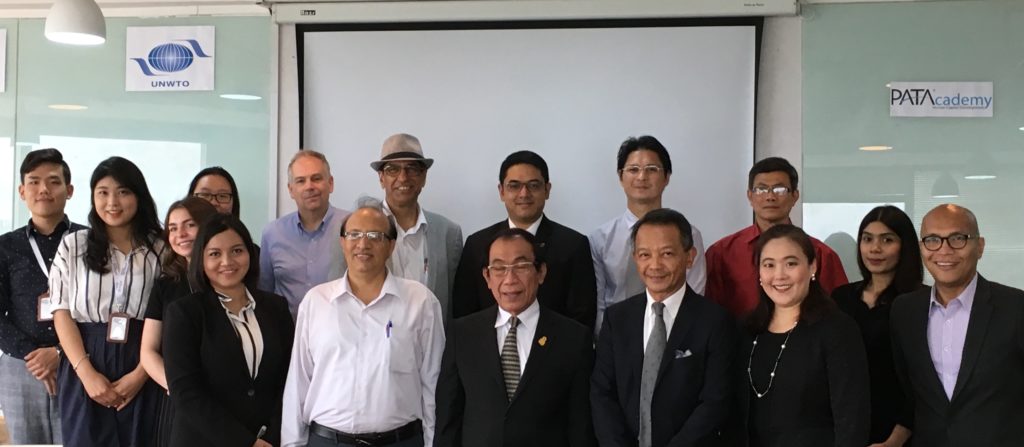
Participants in the resinar: The speakers are: Prof Pakorn (front row, centre), Mr Sanya (front row, fourth from right), and Mr Adam, Mr Muqbil and Mr Hardy (back row, respectively third, fourth and fifth from right).



Liked this article? Share it!